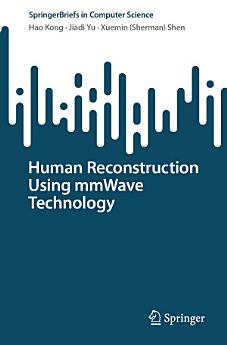Human Reconstruction Using mmWave Technology
À propos de cet ebook
Human and the cyberworld are moving towards high synchronization as more IoT devices are integrated in smart homes. By reconstructing human postures, facial expressions, and hand gestures in the cyberworld, a virtual human avatar can map the state of human into the physical world and deeply integrate reality and virtuality. The process strongly energizes emerging applications such as virtual reality, augmented reality, meta-universe, immersive games, etc.
This book targets graduate-level students majoring in the computer science and engineering, and electrical engineering. Professionals working in wireless signal-based human sensing will also find this book a valuable resource.
Quelques mots sur l'auteur
Dr. Hao Kong is currently an assistant professor in School of Computer Engineering and Science, Shanghai University. He received his Ph.D. degree in the Department of Computer Science and Engineering of Shanghai Jiao Tong University, in 2023. From February 2022 to February 2023, he visited the Broadband Communications Research (BBCR) Lab, Department of Electrical and Computer Engineering, University of Waterloo, Canada. His research focuses on Internet of Things, wireless sensing and mobile computing. He has published over 10 papers on high-reputation journals and conferences, including IEEE TMC, IEEE/ACM TON, IEEE COMST, ACM MobiSys, ACM MobiHoc, IEEE INFOCOM, etc., and one monograph.
Dr. Jiadi Yu received the PhD degree in computer science from Shanghai Jiao Tong University, China, in Jun. 2007. After that, he was at Shanghai Jiao Tong University, China, (from Jul. 2007 to Jan. 2009) and Stevens Institute of Technology, USA, (from Feb. 2009 to Dec. 2011), respectively, as Postdoctoral research associate in computer science. And then, he joined Dept. of Computer Science and Engineering, Shanghai Jiao Tong University as assistant professor. He is currently an Associate Professor in Department of Computer Science and Engineering, Shanghai Jiao Tong University, Shanghai, China. Dr. Yu is an active and accomplished researcher in the field of Mobile Computing and Sensing, Cyber Security and Privacy, and Internet of Things. He has published more than 100 refereed paper including ACM MobiCom, ACM MobiSys, ACM MobiHoc, ACM UbiComp, IEEE INFOCOM, IEEE ICDCS, IEEE TMC, IEEE ToN, IEEE TPDS, etc. His works were reported in IEEE Xplore Innovation Spotlight, 2017, and IEEE Spectrum, 2019. He was Publicity Co-Chair of IEEE DySPAN 2019 and ACM WiSec 2019, and was TPC Member of IEEE INFOCOM(2016-2022), AAAI 2022, IEEE ICDCS 2022, IEEE ICPADS(2014, 2019,2020), etc.




